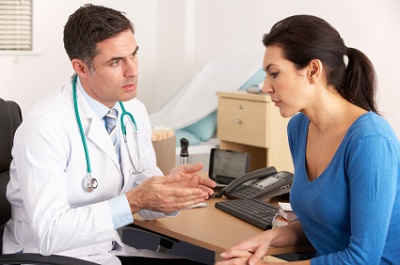 Ovarian cancer is the fourth most common cancer in women. The ovaries are two small, oval-shaped organs on each side of your womb in the pelvis (lower abdomen). Each month, in a woman who is fertile, an egg is made in one of the ovaries. The egg leaves the ovary and passes down a tube called the fallopian tube to the womb. The ovaries also make the female sex hormones, oestrogen and progesterone.
Ovarian cancer is the fourth most common cancer in women. The ovaries are two small, oval-shaped organs on each side of your womb in the pelvis (lower abdomen). Each month, in a woman who is fertile, an egg is made in one of the ovaries. The egg leaves the ovary and passes down a tube called the fallopian tube to the womb. The ovaries also make the female sex hormones, oestrogen and progesterone.
Cancer of the ovary is when the normal cells in the ovary change and grow out of control to form a malignant tumour or cancer. Because the ovaries are deep in the pelvis, most women will not notice any symptoms in the early stages of ovarian cancer, and it can take a long time for symptoms to occur. As the tumour gets bigger it may affect nearby organs. This can include the bladder or the bowel. When this happens, the tumour may affect how theses organs normally work. This, in turn, can lead to symptoms. When symptoms do appear they can be mild or vague and can include:
-
A bloated feeling
-
A persistent swollen abdomen
-
Pain or dragging sensation in your lower abdomen or side
-
Pain during sex
-
Nausea
-
Poor appetite and feeling full quickly
-
Changes in your bowel or bladder habits; for example, constipation or needing to pass water urgently
-
Rarely ovarian cancer causes abnormal vaginal discharge or bleeding.
Even though these symptoms can be caused by complaints other than cancer, you should have them checked by your doctor – especially if they are persistent and do not go away. Visit your GP if you are worried about any symptoms. Your GP will examine you first and, if they are concerned about you, they will normally arrange some blood tests and an ultrasound of your ovaries. You may also be referred to a gynaecologist for a specialist opinion.

The cause of cancer of the ovary is unknown. but there are things called risk factors that can increase your chance of getting the disease. Who is at risk of ovarian cancer?
-
Ovarian cancer can run in families. Your ovarian cancer risk is increased if your mother, sister, or daughter has (or has had) ovarian cancer. Increased risk for ovarian cancer can also come from your father's side.
-
A family history of some other types of cancer such as colorectal and breast cancer is linked to an increased risk of ovarian cancer. This is because these cancers can be caused by an inherited mutation (change) in certain genes that cause a family cancer syndrome that increases the risk of ovarian cancer. About 5 to 10% of ovarian cancers are a part of family cancer syndromes resulting from inherited changes (mutations) in certain genes.
-
The risk of developing ovarian cancer gets higher with age. Ovarian cancer is rare in women younger than 40. Most ovarian cancers develop after menopause. Half of all ovarian cancers are found in women 63 years of age or older.
-
Obese women (those with a body mass index of at least 30) have a higher risk of developing ovarian cancer.
-
Women who have a baby before age 26 have a lower risk of ovarian cancer than women who have not. The risk goes down with each full-term pregnancy. Women who have their first pregnancy after age 35 or who never had a baby have a higher risk of ovarian cancer.
-
Breastfeeding may lower the risk even further.
-
Women who have used birth control pills have a lower risk of ovarian cancer.
-
There is a slightly higher risk if you have received hormone replacement therapy (HRT) and received drugs to stimulate the ovary during infertility treatments.
Some women in the high risk groups request ovarian cancer screening from their doctor. There is no national ovarian cancer screening programme in Ireland. Screening tests try to identify a condition at an early stage before it causes complications and where treatment can cure the condition. Screening tests for ovarian cancer involve a pelvic ultrasound scan and Ca125 blood test. CA125 is a chemical found in blood that is released from ovarian cancer cells. It is known as a tumour marker for ovarian cancer. Not all women with ovarian cancer will have a raised CA125.
Each year over 300 Irish women are diagnosed with ovarian cancer – if you are worried visit your GP.












